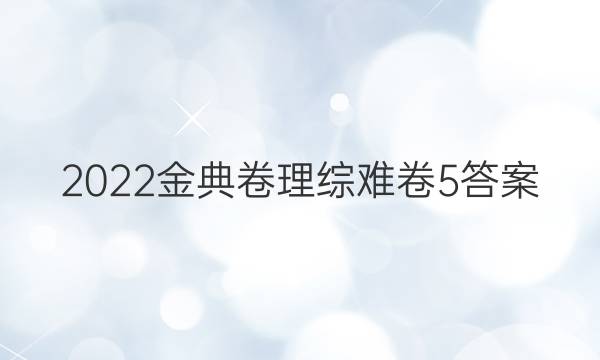高考模擬2022全國100所名校金典了卷答案,目前我們已經(jīng)整理了高考模擬2022全國100所名校金典了卷答案的各科答案和試卷,更多全國100所名校請關(guān)注本網(wǎng)站。

2021-2022年100所金典卷各科試題及答案
1. (2019高一下·成都期末) 閱讀理解The Scottish composer Evelyn Glennie lost nearly all her hearing as a young girl, yet w ent on to a very successful career in music including winning Grammy awards. When somebody asks her, "How do you hear?" She responds, "How do you hear? Is it only with your ears?" For Glennie, and for us too, listening is not only hearing; it is understanding. We need to listen to w hat is said and unsaid, and also how it is said.
It' s important to hear what people say accurately. As Mark Twain said, "The difference betw een the right word and the almost right word is the difference between lightning and the lightning bug (螢火蟲)." If you miss something or you' re not sure you' ve heard accurately, ask the speakers. At this point you' re not evaluating, just looking for accuracy and understanding. Here are some ways to get clear about what they say and don' t say. Why are they saying this now, instead of sooner or later? Why are they emphasizing these points, instead of something else?
Listen to how it is said. People send signals about what they mean with their voices and body language that sometimes differ from the words they say. While going through the next points, think about someone whose real meaning you might sometimes miss, and see if any of these signals might come up. First, voices. When others speak, notice changes in their volume, pace, and tone. Second, body language. Notice gestures, eye contact, and facial expressions. Do these sync what they are saying, or do they tell a different story? Third, emotions. What is the person apparently feeling? Now you might not know for sure, but be considerate, open to understanding, and ask thoughtful questions.
1. (2019高一上·江蘇開學(xué)考) 閱讀理解 Humans are social animals. They live in groups all over the world. As these groups of people live apart from other groups, over the years and centuries they develop their own habits and ideas, which are different from other cultures. One important particular side of every culture is how its people deal with time. Time is not very important in nonindustrial societies. The Nuer people of East Africa, for example, do not even have a word TIME that is in agreement with the abstract thing we call time. The daily lives of the people of such nonindustrial societies are likely to be patterned around their physical needs and natural events rather than around a time schedule(時間表)based on the clock. They cook and eat when they are hungry and sleep when the sun goes down. They plant crops during the growing seasons and harvest them when the crops are ripe. They measure time not by a clock or calendar(日歷), but by saying that an event takes place before or after some other event Frequently such a society measures days in terms of "sleeps" or longer periods in terms of "moons." Some cultures, such as the Eskimos of Greenland measure seasons according to the migration of certain animals. Some cultures which do not have a written language or keep written records have developed interesting ways of "telling time". For example, when several Australian aborigines want to plan an event for a future time, one of them places a stone on a cliff or in a tree. Each day the angle of the sun changes slightly. In a few days, the rays of the sun strike the stone in a certain way. When this happens, the people see that the agreed-upon time has arrived and the event can take place. In contrast(成對比), exactly correct measurement of time is very important in modern, industrialized societies. This is because industrialized societies require the helpful efforts of many people in order to work. For a factory to work efficiently(well, quickly and without waste), for example, all of the workers must work at the same time. Therefore, they must know what time to start work in the morning and what time they may go home in the afternoon. Passengers must know the exact time that an airplane will arrive or depart. Students and teachers need to know when a class starts and ends. Stores must open on time in order to serve their customers. Complicated(復(fù)雜的)societies need clocks and calendars. Thus, we can see that if each person worked according to his or her own schedule, a complicated society could hardly work at all.
標簽: 100所金典卷





![2022屆100所名校高考模擬金典卷·理科綜合[20·JD·理綜卷-N]-物理部分(十一)11答答案](https://751p.oss-cn-hongkong.aliyuncs.com/2021/08/7275146851565637315.jpg)
![2022屆100所名校高考模擬金典卷·文科綜合[20·JD·文綜卷-Y]-政治部分(二)2答案](https://751p.oss-cn-hongkong.aliyuncs.com/2021/08/6445243810868787971.jpg)
5答案](https://751p.oss-cn-hongkong.aliyuncs.com/2021/08/5544536059690811162.jpg)
8答案](https://751p.oss-cn-hongkong.aliyuncs.com/2021/08/5932866133539724574.jpg)
評論列表
還熱乎[捂臉][捂臉][捂臉]
來了來了[送心][送心][送心]
我也驚呆了[捂臉]
[打臉][打臉][打臉]
猿寶們給我點個贊,轉(zhuǎn)發(fā)三連一下呀[流淚][流淚]
一個先苦后甜,一個先甜后苦。總覺得以后的甜苦滋味不一定能嘗到,但當下的甜和苦卻立刻可以選一樣,那么,大部分人選那樣?